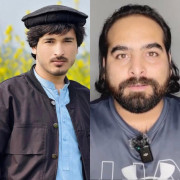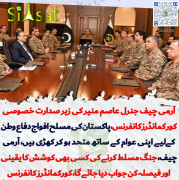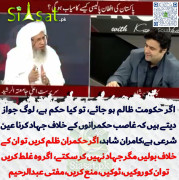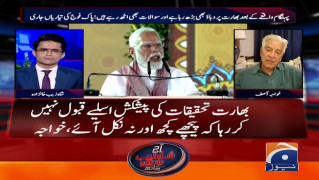M Ali Khan
Minister (2k+ posts)
[TABLE="width: 100%"]
[TR]
[TD="class: auto-style1, colspan: 2"]Taliban gain strength in Karachi
http://www.thefridaytimes.com/beta3/tft/article.php?issue=20121109&page=6
[/TD]
[/TR]
[TR]
[TD="class: auto-style5, colspan: 2"]
[/TD]
[/TR]
[TR]
[TD="colspan: 2"] [/TD]
[/TR]
[TR]
[TD="class: imgborder, colspan: 2"] [/TD]
[/TD]
[/TR]
[TR]
[TD="colspan: 2"] [/TD]
[/TR]
[/TABLE]
The Supreme Court has asked the government in a provisional order last week to crack down on the growing Taliban presence in Karachi.
The decision comes amid an announcement by the MQM that it will hold a referendum across Pakistan to let the people of the country choose between Jinnah's Pakistan and Taliban's Pakistan. The event was delayed because of the Ideas 2012 defence exhibition in Karachi, but the party said it would not yield to any Taliban threats.
[TABLE="align: right"]
[TR]
[TD="width: 1"][/TD]
[TD]
 [/TD]
[/TD]
[/TR]
[TR]
[TD="width: 1"] [/TD]
[TD="class: auto-style29, align: center"]
Security officials inspect the scene of a suicide car bomb attack targeting the residence of CID officer Chaudhry Aslam last year
[/TD]
[/TR]
[TR]
[TD="width: 1"] [/TD]
[TD]
 [/TD]
[/TD]
[/TR]
[/TABLE]
"MQM is the only political party that has consistently been talking about the Talibanization of Karachi and Pakistan since the 1980s and our leader Altaf Hussain has been the boldest in his opposition to the Taliban and making deals with them in Swat or Waziristan," said Mustafa Azizabadi, in charge of MQM's London Secretariat. "Our referendum is in line with the same policy," he said, "and it will help galvanize public opinion in Pakistan against the Taliban." He said his party was sure most Pakistanis do not agree with the Taliban and want a progressive Pakistan.
But the Taliban do not seem to care about public opinion. "We are a group of Islamic warriors fighting against infidels," its spokesman Umar Farooq said. "Karachi is our base and we will target anyone our leader Hakimullah Mehsud tells us to," said the former Jamaat-e-Islami activist who went to Karachi University.
[TABLE="align: left"]
[TR]
[TD][h=4]Taliban want to take over the Pashtun-dominated areas of Karachi from the Awami National Party, and have killed several ANP leaders[/h][/TD]
[/TR]
[/TABLE]
According Sindh Police and CID, the Taliban have been involved in 131 bank robberies since 2008, all but three of the total. CID claims it has held 721 militants and over 143 gangs related to the Taliban in the city. "They attacked my house in retaliation," CID officer Chaudhry Aslam said. "The officers working against the Taliban in Karachi are under constant threat. There was a suicide attack on one of our SSPs too."
"The problem is the changing demography of Karachi. Over 2 million IDPs came to Karachi after the Swat and Waziristan operations and a lot of them were criminals associated with the Taliban," said Ibrahim Khattak, a former IB director who retired recently. "Karachi is there cash-cow. Bank robberies, extortion and even revenge killings are carried out by Taliban men." Khattak said the Taliban wanted to take over the Pashtun-dominated areas from the Awami National Party, and that is why they were targeting its leaders.
"The threat from Taliban is real," said ANP Sindh leader Bashir Jan. Jan has survived two assassination attempts in Karachi. "They are after us because of our stance against the Taliban, and that is why our workers are being killed in Karachi."
The Taliban presence in Karachi has grown over several years, and is closely linked to the presence and support of Al Qaeda. By late 2001, as international troops arrived in Afghanistan, Al Qaeda fighters started infiltrating Pakistan and made Karachi their base. Their modus-operandi was simple but elaborate. Local jihadi organizations were instructed to rent apartments across Karachi at least two months in advance of a planned attack and wait. By 2002, Al Qaeda had turned Karachi into the center of its activities.
[TABLE="align: right"]
[TR]
[TD][h=4]Taliban have been involved in all but three of the total 134 bank robberies in Karachi since 2008[/h][/TD]
[/TR]
[/TABLE]
Al Qaeda selected Karachi because it was known for ethnic and sectarian violence. But with the arrival of Al Qaida, a new dimension was added to the cities growing crime problem: suicide bombings.
The suicide bombing of French Naval workers in Karachi in May of 2002 came as a surprise to many and was officially the start of Al Qaeda operations in Karachi. It was also the first time a local jihadi group - Harkatul Mujahideen al Almi - was used for logistics while the suicide bomber was from Al Qaeda.
Former president Pervez Musharraf and the US consulate were targeted a month later. And although Pakistan extradited 422 Al Qaeda members that summer (86 of them caught from Karachi alone) the first major breakthrough was the arrest of Ramzi al-Shaibah who once worked for Al Qaeda's Hamburg cell.
Khaled Sheikh Muhammad, who became al-Qaida's operational chief in 2002, had formed a close operational link with local groups and ran Al Qaeda from flats in the posh DHA and Bahadarabad Society. The breakthrough intelligence regarding his whereabouts came in June of 2002 when Al Jazeera anchor Yosri Fouda received an invitation from Al Qaeda to conduct an interview in Karachi with both KSM and Ramzi bin al-Shibh.
In January of 2003 Jack Thomas - an Australian Al Qaeda fugitive - was captured in Karachi which gave 'actionable intelligence' on the whereabouts of KSM who was finally caught in Rawalpindi in March - too late to prevent the beheading of Daniel Pearl and the establishment of a strong nexus with the local sectarian groups working in Karachi, which had turned into Al Qaeda's B team.
Jundullah's Karachi chapter was founded originally by a student activist named Attaur Rehman in 2003. Jundullah was initially a well-knit cell comprising of some 20 militants, most of them in their twenties and thirties; educated from professional working classes they attacked Karachi Corps Commander General Ahsan Saleem Hayat, bombed a US Consulate and carried out a series of terrorist attacks, including last year's triple bombings in an Ashura procession in Karachi.
On May 2, 2003, a plot by Al Qaeda to crash a small aircraft loaded with explosives into the US Consulate in Karachi was uncovered after the arrest of Walid Ba'Attash who played a significant role in planning the 9-11 attacks.
In March of 2004 the Karachi police arrested brothers Dr Akmal Waheed and Dr Arshad Waheed who were suspected of assisting wanted militants and providing medical treatment to three fugitives: Abu Massab, Gul Hasan and Qassam-al-Sani, who were wounded in the Gen Hayat attempt.
"The current safehouses for the Taliban in Karachi are provided by Jamaat-e-Islami and some Deobandi madrassas, and there is ample evidence that the Taliban work with sectarian organizations in Karachi," an ISI official from Karachi said.
But Al Qaeda remains the biggest terrorist planning and financing organization in Karachi, and still works with the Taliban, especially the faction formerly known as Qari Zafar group (before its leader was killed in a drone attack), which has some support in the huge Mehsud population in Karachi's outskirts. The operational details are left to local groups.
[TR]
[TD="class: auto-style1, colspan: 2"]Taliban gain strength in Karachi
http://www.thefridaytimes.com/beta3/tft/article.php?issue=20121109&page=6
[/TD]
[/TR]
[TR]
[TD="class: auto-style5, colspan: 2"]
[/TD]
[/TR]
[TR]
[TD="colspan: 2"] [/TD]
[/TR]
[TR]
[TD="class: imgborder, colspan: 2"]
 [/TD]
[/TD][/TR]
[TR]
[TD="colspan: 2"] [/TD]
[/TR]
[/TABLE]
The Supreme Court has asked the government in a provisional order last week to crack down on the growing Taliban presence in Karachi.
The decision comes amid an announcement by the MQM that it will hold a referendum across Pakistan to let the people of the country choose between Jinnah's Pakistan and Taliban's Pakistan. The event was delayed because of the Ideas 2012 defence exhibition in Karachi, but the party said it would not yield to any Taliban threats.
[TABLE="align: right"]
[TR]
[TD="width: 1"][/TD]
[TD]

[/TR]
[TR]
[TD="width: 1"] [/TD]
[TD="class: auto-style29, align: center"]

Security officials inspect the scene of a suicide car bomb attack targeting the residence of CID officer Chaudhry Aslam last year
[/TD]
[/TR]
[TR]
[TD="width: 1"] [/TD]
[TD]

[/TR]
[/TABLE]
"MQM is the only political party that has consistently been talking about the Talibanization of Karachi and Pakistan since the 1980s and our leader Altaf Hussain has been the boldest in his opposition to the Taliban and making deals with them in Swat or Waziristan," said Mustafa Azizabadi, in charge of MQM's London Secretariat. "Our referendum is in line with the same policy," he said, "and it will help galvanize public opinion in Pakistan against the Taliban." He said his party was sure most Pakistanis do not agree with the Taliban and want a progressive Pakistan.
But the Taliban do not seem to care about public opinion. "We are a group of Islamic warriors fighting against infidels," its spokesman Umar Farooq said. "Karachi is our base and we will target anyone our leader Hakimullah Mehsud tells us to," said the former Jamaat-e-Islami activist who went to Karachi University.
[TABLE="align: left"]
[TR]
[TD][h=4]Taliban want to take over the Pashtun-dominated areas of Karachi from the Awami National Party, and have killed several ANP leaders[/h][/TD]
[/TR]
[/TABLE]
According Sindh Police and CID, the Taliban have been involved in 131 bank robberies since 2008, all but three of the total. CID claims it has held 721 militants and over 143 gangs related to the Taliban in the city. "They attacked my house in retaliation," CID officer Chaudhry Aslam said. "The officers working against the Taliban in Karachi are under constant threat. There was a suicide attack on one of our SSPs too."
"The problem is the changing demography of Karachi. Over 2 million IDPs came to Karachi after the Swat and Waziristan operations and a lot of them were criminals associated with the Taliban," said Ibrahim Khattak, a former IB director who retired recently. "Karachi is there cash-cow. Bank robberies, extortion and even revenge killings are carried out by Taliban men." Khattak said the Taliban wanted to take over the Pashtun-dominated areas from the Awami National Party, and that is why they were targeting its leaders.
"The threat from Taliban is real," said ANP Sindh leader Bashir Jan. Jan has survived two assassination attempts in Karachi. "They are after us because of our stance against the Taliban, and that is why our workers are being killed in Karachi."
The Taliban presence in Karachi has grown over several years, and is closely linked to the presence and support of Al Qaeda. By late 2001, as international troops arrived in Afghanistan, Al Qaeda fighters started infiltrating Pakistan and made Karachi their base. Their modus-operandi was simple but elaborate. Local jihadi organizations were instructed to rent apartments across Karachi at least two months in advance of a planned attack and wait. By 2002, Al Qaeda had turned Karachi into the center of its activities.
[TABLE="align: right"]
[TR]
[TD][h=4]Taliban have been involved in all but three of the total 134 bank robberies in Karachi since 2008[/h][/TD]
[/TR]
[/TABLE]
Al Qaeda selected Karachi because it was known for ethnic and sectarian violence. But with the arrival of Al Qaida, a new dimension was added to the cities growing crime problem: suicide bombings.
The suicide bombing of French Naval workers in Karachi in May of 2002 came as a surprise to many and was officially the start of Al Qaeda operations in Karachi. It was also the first time a local jihadi group - Harkatul Mujahideen al Almi - was used for logistics while the suicide bomber was from Al Qaeda.
Former president Pervez Musharraf and the US consulate were targeted a month later. And although Pakistan extradited 422 Al Qaeda members that summer (86 of them caught from Karachi alone) the first major breakthrough was the arrest of Ramzi al-Shaibah who once worked for Al Qaeda's Hamburg cell.
Khaled Sheikh Muhammad, who became al-Qaida's operational chief in 2002, had formed a close operational link with local groups and ran Al Qaeda from flats in the posh DHA and Bahadarabad Society. The breakthrough intelligence regarding his whereabouts came in June of 2002 when Al Jazeera anchor Yosri Fouda received an invitation from Al Qaeda to conduct an interview in Karachi with both KSM and Ramzi bin al-Shibh.
In January of 2003 Jack Thomas - an Australian Al Qaeda fugitive - was captured in Karachi which gave 'actionable intelligence' on the whereabouts of KSM who was finally caught in Rawalpindi in March - too late to prevent the beheading of Daniel Pearl and the establishment of a strong nexus with the local sectarian groups working in Karachi, which had turned into Al Qaeda's B team.
Jundullah's Karachi chapter was founded originally by a student activist named Attaur Rehman in 2003. Jundullah was initially a well-knit cell comprising of some 20 militants, most of them in their twenties and thirties; educated from professional working classes they attacked Karachi Corps Commander General Ahsan Saleem Hayat, bombed a US Consulate and carried out a series of terrorist attacks, including last year's triple bombings in an Ashura procession in Karachi.
On May 2, 2003, a plot by Al Qaeda to crash a small aircraft loaded with explosives into the US Consulate in Karachi was uncovered after the arrest of Walid Ba'Attash who played a significant role in planning the 9-11 attacks.
In March of 2004 the Karachi police arrested brothers Dr Akmal Waheed and Dr Arshad Waheed who were suspected of assisting wanted militants and providing medical treatment to three fugitives: Abu Massab, Gul Hasan and Qassam-al-Sani, who were wounded in the Gen Hayat attempt.
"The current safehouses for the Taliban in Karachi are provided by Jamaat-e-Islami and some Deobandi madrassas, and there is ample evidence that the Taliban work with sectarian organizations in Karachi," an ISI official from Karachi said.
But Al Qaeda remains the biggest terrorist planning and financing organization in Karachi, and still works with the Taliban, especially the faction formerly known as Qari Zafar group (before its leader was killed in a drone attack), which has some support in the huge Mehsud population in Karachi's outskirts. The operational details are left to local groups.

























